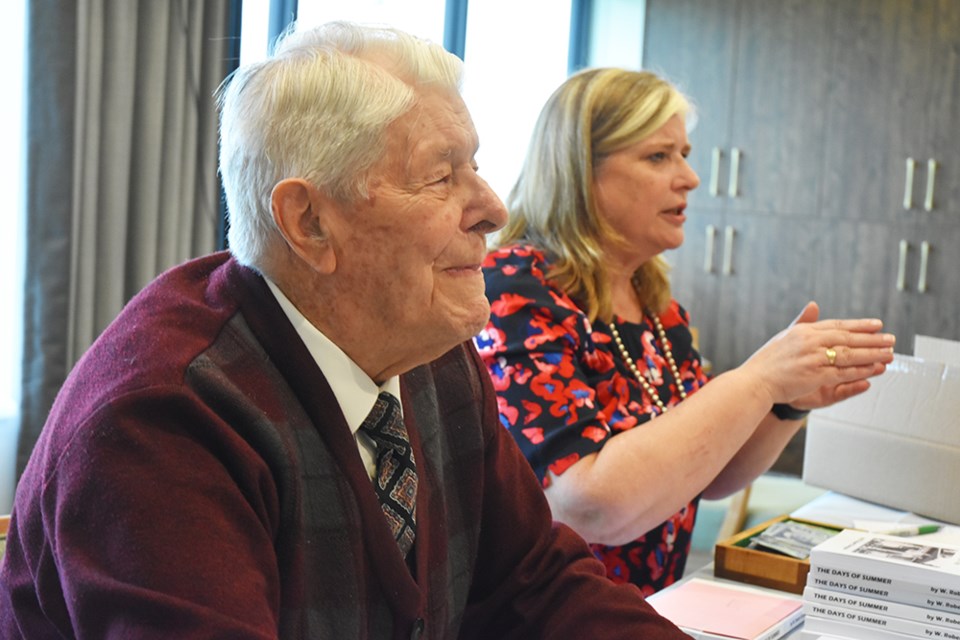When W. Robert Sturgeon decided to move into The Elden of Bradford retirement residence, Marketing Manager Jaime Robertson made him a promise: The Elden would hold a party to launch his latest book, when it was ready.
Bob Sturgeon was already a published author. A contributor to Governor Simcoe Slept Here: The legacy of West Gwillimbury, he had written Musings from a Country Churchyard about Coulson’s Hill Cemetery; The Straight Furrow, and Save the Last Dance for Me – reminiscences of growing up in West Gwillimbury.
His fourth book was just being printed.
On May 28, The Elden kept its promise. More than 50 guests, some of them fellow residents at The Elden, came out for the launch of The Days of Summer, an event that included a book reading, book-signing, and refreshments.
Sturgeon, now 95, was accompanied by daughters Carolee Mason and Heather Sturgeon.
“We’re quite excited to be launching book No. 4,” said Carolee, thanking the publishers for “making Dad’s memories and recollections into something we can share.”
The series – The Straight Furrow, Save the Last Dance for Me, and The Days of Summer – capture Sturgeon’s memories of farming, social life, the related Mitchell Family of Kleinburg, and “a lot of local history,” she said, dating back to the 1930s.
Asked how he started writing, Sturgeon credited the late George Jackson for inviting him to contribute a chapter on surveying West Gwillimbury Township, for the two-volume history, Governor Simcoe Slept Here. That done, Jackson asked him, “Now you’ve done that, how about doing the evolution of agriculture?”
Said Sturgeon, “It was quite an effort… It was really a trip back in history!”
He also credited his daughters for telling him: “You’re a great storyteller. Put some of these stories on paper!”
“I don’t believe these books would have come about, if I hadn’t been pushed by my two daughters," he said.
“We did the typing. The rest is him,” responded Carolee.
The Days of Summer describes summer vacation as a youngster at the Mitchell Family Farm in Kleinburg, “and memories of other getaways, the things farmers did when they weren’t farming,” she said.
Summers in Kleinburg were “carefree” up until 1935, when Sturgeon was old enough to help out on the farm; then summer vacation became “much more labour intensive.”
The Mitchells eventually put their farm up for sale in 1950, selling a portion of the land to Robert McMichael for what was to become the McMichael Canadian Collection.
Acres that Sturgeon help cut for firewood have long since been reforested as conservation lands. The rest of the farm was built over, occupied by a school and new housing.
“It shows how much this area has changed, in a very short time – how different it was, not even 50 years ago,” said Carolee. “The farmland has been lost. We don’t want to see the stories lost.”
“It’s so important to remember the stories and the hard work and the perseverance that went into farming,” agreed BWG Mayor Rob Keffer, a guest at the book launch.
So how does one start writing? “One word at a time,” said Bob Sturgeon. “I think it’s important to put these stories down in your own words.”
“Rather than just telling stories, all it takes is your pen in your hand or your computer at your side,” said Carolee, urging the younger generation to record the tales. “I think the worst thing that can happen is stories don’t get told, and disappear.”
She added, “They’re a real window into the social history of the time, and we don’t get that any other way.”
There was a question-and-answer session, and sharing of reminiscences… When Bob Sturgeon was growing up, the town of Bradford had a population of about 1,000, policed by one man – Walter ‘Gunch’ Reeves – and his police dog.
“There wasn’t much crime,” said Sturgeon.
On Saturday nights, stores stayed open late, as farmers came into town to do their shopping. “And you could buy an ice cream cone for five cents from Ritchie’s Pharmacy or Cousin’s Dairy,” said Carolee.
Guests lined up to purchase The Days of Summer, signed by the author, at the special price of $15. Proceeds from the sales will go toward the preservation of Coulson’s Hill Cemetery and church.
